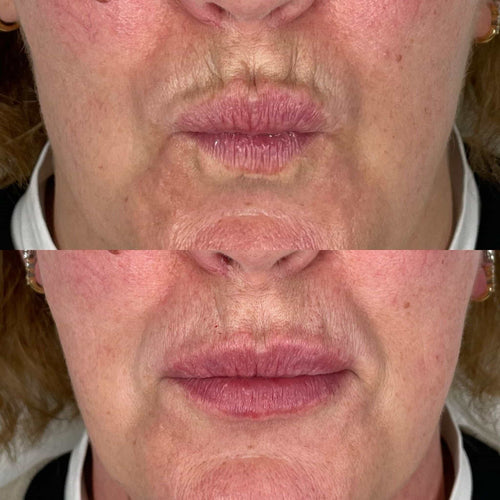Arrange Your Dermal Filler Session with Dr. Laura Geige
Timeline for Ibuprofen After Lip Fillers
Immediate Post-Treatment
After receiving lip fillers, it’s crucial to avoid certain medications, including **ibuprofen**, for a specific period.
Ibuprofen is a nonsteroidal anti-inflammatory drug (NSAID) that can thin the blood and increase bleeding risks. This poses a significant concern after lip filler injections because it can lead to bruising, swelling, or even the dispersal of the filler.
Most practitioners recommend waiting at least **24 hours** after lip fillers before taking ibuprofen or any other NSAIDs.
During this initial 24-hour period, prioritize gentle care for your lips:
• **Apply ice packs:** This helps minimize swelling and discomfort.
• **Keep lips hydrated:** Use a lip balm to soothe dryness.
• **Avoid strenuous activities:** Refrain from vigorous exercise that may increase blood flow to the area.
After the 24-hour mark, you can resume taking ibuprofen as needed. However, it’s always best to consult with your injector for personalized advice based on your specific circumstances and any underlying medical conditions.
Waiting Period Potential Complications and Consultation with a Provider
It is generally recommended to avoid taking ibuprofen (or other nonsteroidal anti-inflammatory drugs, NSAIDs) for at least 24 hours after getting lip filler.
NSAIDs can increase the risk of bruising, swelling, and bleeding, which are already common side effects of lip fillers. They work by reducing inflammation, but this can also interfere with the body’s natural healing process after the procedure.
A 24-hour waiting period allows your lips to start healing and reduces the chances of complications. However, it’s crucial to consult with your provider for specific instructions as individual circumstances may vary.
Potential Complications:
While rare, potential complications from lip fillers can include:
- Bruising
- Swelling
- Infection
- Lumps or bumps
- Asymmetry
- Allergic reactions
It’s essential to discuss any concerns you have about ibuprofen use or potential complications with your provider before and after the procedure.
They can provide personalized advice based on your medical history, the type of filler used, and other factors.
Consulting your Provider:
Your provider is your best source of information regarding post-treatment care, including medication use.
Don’t hesitate to ask them any questions you have about ibuprofen or any other medications you take.
Book Your Dermal Filler Appointment with Dr. Laura Geige Now
Factors Influencing Individual Needs
Medical History Type of Filler Used Individual Healing Response
Several factors influence an individual’s needs regarding pain management after lip filler, including their medical history, **type of filler used**, and personal healing response.
An individual’s *medical history* plays a crucial role in determining the appropriate post-procedure care. Patients with pre-existing conditions like diabetes, blood clotting disorders, or allergies may require specific instructions regarding pain medication use.
The type of filler used can also influence pain levels and recovery time. Hyaluronic acid fillers are generally well-tolerated and tend to cause less discomfort than other types.
An individual’s *healing response* is unique to them and can significantly affect how they experience pain after lip filler. Some individuals heal quickly with minimal swelling and bruising, while others may experience more prolonged discomfort.
It’s important for patients to discuss their individual circumstances with their injector before undergoing any treatment. This allows for personalized advice regarding pain management strategies, including the appropriate use of medications like ibuprofen.
Managing Pain and Swelling Safely
Alternative Medications
Managing pain and swelling safely after lip filler treatment is crucial for optimal results and minimizing discomfort.

Ibuprofen, a nonsteroidal anti-inflammatory drug (NSAID), is commonly recommended to alleviate pain and reduce inflammation associated with lip fillers. However, it’s essential to consult your injector or healthcare provider regarding the appropriate timing and dosage of ibuprofen after treatment.
Generally, avoiding NSAIDs like ibuprofen for the first 24-48 hours after lip filler injections is advised. This allows the injected area time to settle and reduces the risk of excessive bleeding or bruising.
Book a Dermal Filler Appointment with Dr. Laura Geige Today
After this initial period, your injector may recommend a low dose of ibuprofen as needed for pain management. It’s important to follow their specific instructions and not exceed the recommended dosage.
Alternative medications for managing pain and swelling after lip fillers include:
-
Acetaminophen (Tylenol):
-
Arnica gel or cream:
-
Cold compresses:
Acetaminophen is a pain reliever that does not have anti-inflammatory properties. It can be taken as directed on the packaging or as advised by your injector.
Arnica gel or cream contains a natural substance that may help reduce inflammation and bruising. Apply it to the treated area as directed on the product label.
Cold compresses applied for 10-15 minutes at a time can help constrict blood vessels and minimize swelling.
Remember, it’s always best to consult your injector or healthcare provider before taking any medications, including over-the-counter options, after receiving lip fillers.
Cold Compress Application Lifestyle Modifications for Optimal Recovery**
Managing pain and swelling safely after a procedure like lip filler is crucial for optimal recovery. While ibuprofen can help, it’s essential to understand when it’s safe to use and how to complement medication with other strategies.
Cold Compress Application:
Applying cold compresses immediately after lip filler treatment and for the following 24-48 hours can significantly reduce swelling. Use an ice pack wrapped in a thin towel, applying it to the treated area for 15-20 minutes at a time, several times a day. Avoid direct contact with skin to prevent frostbite.
Lifestyle Modifications:
Alongside cold compresses, certain lifestyle modifications can expedite healing and minimize discomfort:
* **Elevate your head:** Sleeping with an extra pillow can help reduce fluid buildup in the treated area.
* **Stay hydrated:** Drinking plenty of water aids in flushing out excess fluids and promoting overall recovery.
* **Avoid strenuous activity:** Minimize physical exertion that might increase blood flow and exacerbate swelling.
* **Refrain from touching or picking at the area:** This can introduce bacteria and delay healing.
* **Eat a balanced diet rich in antioxidants:** These nutrients support tissue repair and reduce inflammation.
Ibuprofen Considerations:
Consult your practitioner regarding when it’s safe to take ibuprofen after lip filler. Generally, waiting 24 hours can be advisable to avoid interfering with the initial healing process.
Follow your provider’s instructions on dosage and duration of use, as exceeding recommended amounts can increase risks like stomach irritation or ulcers.
* **Never take ibuprofen if you have a history of gastrointestinal issues without consulting your doctor first.*
Remember: If you experience excessive pain, severe swelling, bruising, or any signs of infection (redness, warmth, pus), seek immediate medical attention.
Press on Honey Ring of the Reeks Cycle Tattoo Culture Magazine Melissa Neufeld One One Three Online
- How To Use Kratom Capsules For Stress And Anxiety Relief - May 31, 2025
- Smokers Lines Lip & Mouth Fillers Near Laleham, Surrey - May 31, 2025
- What Is Toxic Positivity And How It Hurts Relationships - May 31, 2025
